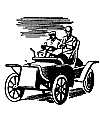 Each year, the Royal Automobile Club of London awarded the Dewar
Trophy for the greatest advance made by any motorcar during the year.
In 1906, Cadillac decided to try for this trophy and shipped three cars
to London. After being tested, they were taken apart and the parts were
all put in one large pile. American mechanics, with ordinary hand
tools, assembled three complete automobiles from that mixture of parts.
They all passed the prescribed test perfectly, and the American company
was awarded the Trophy.
Each year, the Royal Automobile Club of London awarded the Dewar
Trophy for the greatest advance made by any motorcar during the year.
In 1906, Cadillac decided to try for this trophy and shipped three cars
to London. After being tested, they were taken apart and the parts were
all put in one large pile. American mechanics, with ordinary hand
tools, assembled three complete automobiles from that mixture of parts.
They all passed the prescribed test perfectly, and the American company
was awarded the Trophy.In the last 40 years, all industry has made tremendous strides. The techniques of mass production have accelerated the invention and design of thousands of new products, and provided work for millions of people. Our great skill in making special tools and gauges, coupled with the progressive system of assembly makes it possible to produce practically any type of mechanism in large quantities. This is the fourth step in the industrial revolution. When this war came, although we had not previously made guns and tanks and airplanes in large quantities, we did have this important "know-how." That is why, when the government asked for thousands of items of war equipment, industry was already trained and strong through years of experience in serving our great competitive markets. |








